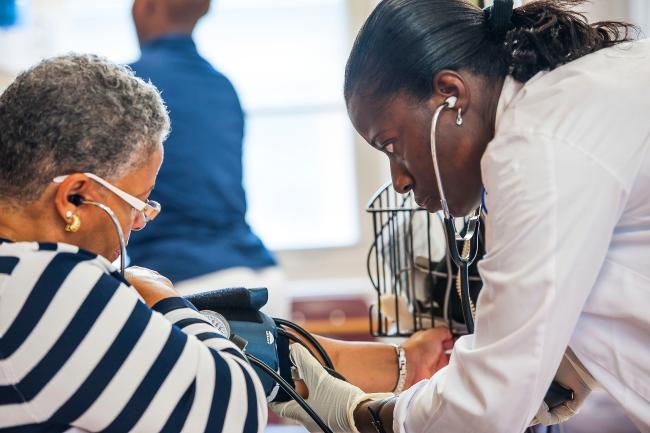By Larry J. Sanders
Howard University announced today a historic $175 million gift from the Bloomberg Philanthropies’ Greenwood Initiative as part of a larger $600 million commitment to the nation’s four historically Black medical schools.
Howard University College of Medicine, Meharry Medical College, and Morehouse School of Medicine will each receive a gift of $175 million, and Charles Drew University of Medicine & Science will receive $75 million. The new funding will more than double three of the four medical schools’ endowments. Funding levels were determined by current class size and anticipated growth. In addition, Xavier University of Louisiana, which is in the process of opening a new medical school, will receive a $5 million grant.
“This is a transformational gift, not only for its impact on cultivating the next generation of health professionals, but for its visionary investment in the intergenerational wealth and health of our medical students and the communities they will serve,” said Howard University President Ben Vinson III, Ph.D.
This unprecedented investment, the largest in the history of contributions to HBCUs will enable Black medical colleges to advance their missions of training the next generation of doctors, diversifying the field of medicine, decreasing the debt load of medical students, and increasing health equity in underserved communities.
“We have much more to do to build a country where every person, regardless of race, has equal access to quality health care – and where students of all backgrounds have an equal opportunity to pursue their dreams,” said Michael R. Bloomberg, founder of Bloomberg Philanthropies and Bloomberg L.P. “Diversifying the medical field and tackling health inequality are society-wide challenges, and Bloomberg Philanthropies is committed to helping to lead the way in tackling them. This gift builds on our earlier investment in these vital institutions, and it will help new generations of Black doctors build a healthier and more equitable future for our country.”
“Endowment support has traditionally been an area of underinvestment for Historically Black Colleges and Universities, but today’s gift is an extraordinary vote of confidence in the lasting benefits of such support,” said President Vinson. “Thank you to Mike Bloomberg and the Bloomberg Philanthropies’ Greenwood Initiative for your inspiring leadership and commitment to addressing the racial wealth gap and decades of underinvestment in Black communities.”
The announcement was made today at the National Medical Association’s Annual Convention and Scientific Assembly, underscoring Bloomberg Philanthropies’ ongoing commitment to racial equity through its Greenwood Initiative. This initiative is designed to address systemic underinvestment in Black institutions and communities, with a focus on advancing racial wealth equity.
“Bloomberg Philanthropies’ Greenwood Initiative understands that inequity in our healthcare systems is far too great a cost to our economy and our collective well-being,” said Garnesha Ezediaro, head of the Greenwood Initiative. “Our continued partnership will build the institutional wealth of the historically Black medical schools, boosting their ability to provide the best training possible for current and future students. Ultimately, the benefits of this gift will be realized in the communities where the next generation of Black doctors practice and among patients who receive their care.”
A Legacy of Leadership in Medical Education
Since its founding, Howard University’s College of Medicine has been among the nation’s leading producers of Black doctors.
“This generous catalytic gift from the Bloomberg Philanthropies Greenwood Initiative will have a lasting effect that will reverberate through generations of future Black and brown doctors,” said Andrea Hayes Dixon, MD, dean of the Howard University College of Medicine. “Because of this day, the onus of the financial commitment that usually hangs over the head of many minority medical students will be lifted allowing these talented youngsters to concentrate solely on becoming some of the world’s outstanding physicians who are committed to bringing hope and healing to underserved communities and increasing the survival of all patients who experience disparities in healthcare.”
With this new funding, the Howard University College of Medicine will be better equipped to manage rising tuition costs, support innovative research, and enhance operational capacity.
Addressing Health Disparities and Racial Inequities
The urgent need to diversify the medical field is underscored by research showing that Black patients have better health outcomes when treated by Black physicians. Despite making up 13 percent of the U.S. population, Black individuals represent only 7 percent of medical school graduates and less than 6 percent of practicing doctors. The Howard University College of Medicine is uniquely positioned to address this disparity by continuing to graduate a significant proportion of the nation’s Black doctors.
The $175 million gift will empower Howard University to expand its efforts in combating health disparities and promoting health equity. By increasing the number of Black doctors in the field, the University is not only contributing to improved health outcomes for Black communities but also helping to address the broader issue of racial wealth inequity. Health disparities contribute to significant economic burdens for families and communities, making the work of the Howard University College of Medicine more critical than ever.
As Howard University College of Medicine moves forward, the University remains committed to its mission of excellence in education, research, and service. With the support of Bloomberg Philanthropies, Howard University will continue to be a leader in shaping the future of healthcare and addressing the needs of underserved communities.
Building on a Legacy of Support
This latest commitment from Bloomberg Philanthropies builds on a $100 million gift made in 2020, which was, at the time, the largest-ever individual philanthropic contribution to historically Black medical schools. That initial investment was instrumental in reducing the student debt of nearly 1,000 future Black doctors, allowing many graduates to pursue careers in underserved communities where the need for quality healthcare is greatest.

